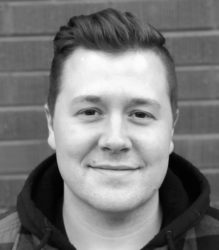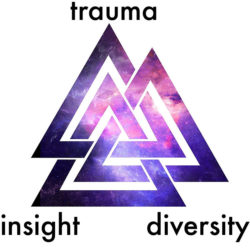The Mad Triangle: Identifying Trauma, Diversity & Insight in Locations of Madness
Chris Cole hosts the Waking Up Bipolar podcast, focused on the  intersection of bipolar disorder and spiritual awakening. He is the author of The Body of Chris: A Memoir of Obsession, Addiction, and Madness, inspired by his own journey of spiritual unfolding and mental health challenges. You can find Chris’s message of spiritual and psychological transformation on Lion’s Roar, Psychology Today, To Write Love on Her Arms, and the International Bipolar Foundation. He offers life coaching for any number of mental health conditions, specializing in bipolar disorder and spiritual emergence. Chris’s experience with addiction, disordered eating, body dysmorphia, psychosis, and spiritual emergency allows him to relate to a wide range of clients. He utilizes a holistic approach to mental health which views wellness in physical, mental, emotional, social, and spiritual domains. Learn more about Chris and his work at colecoaching.com.
intersection of bipolar disorder and spiritual awakening. He is the author of The Body of Chris: A Memoir of Obsession, Addiction, and Madness, inspired by his own journey of spiritual unfolding and mental health challenges. You can find Chris’s message of spiritual and psychological transformation on Lion’s Roar, Psychology Today, To Write Love on Her Arms, and the International Bipolar Foundation. He offers life coaching for any number of mental health conditions, specializing in bipolar disorder and spiritual emergence. Chris’s experience with addiction, disordered eating, body dysmorphia, psychosis, and spiritual emergency allows him to relate to a wide range of clients. He utilizes a holistic approach to mental health which views wellness in physical, mental, emotional, social, and spiritual domains. Learn more about Chris and his work at colecoaching.com.
I‘ve racked my brain around issues of etiology regarding madness, psychosis, and psychiatric criteria in general for about 15 years now. Being effected by the stigma, confusion, and marginalization of altered and extreme states can do that to a person. In recent years, particularly since I’ve started making more connections online following the publication of my book, topics of social justice have greatly influenced my conceptualization of this material.
Mad thinkers, movers, and shakers, as well as neurodivergent and marginalized folks of numerous locations, have shown me that what we think of as pathology exists in relationship—with ourselves, each other, and our environments. Ideas that psychopathology exists in the vacuum of one’s isolated experience only serves to silence discourse and marginalize divergent experiences. If nothing else, it reveals a rudimentary comprehension of human development. Because I can’t quite come up with the perfect name for such a conglomeration of radical thought, I am calling my holistic model the Mad Triangle until further notice. I particular felt the need to publish a blog post about this, to document much of what I have been presenting lately in group settings, workshops, and dialogue.
The Mad Triangle Overview
 The Mad Triangle is extremely expansive, and so it cannot possibly be given justice in a blog post. My hope here is simply to provide a few basics, leading someone into self-identified healing and social locations that may be further explored as desired. By self-selecting psychological and neurological discomfort, folks are empowered to self-determine which aspects of their experiences are problematic, which are special and/or gifts, which are simply divergent experiences, and which experiences are the result of violence, marginalization, and/or systemic oppression.
The Mad Triangle is extremely expansive, and so it cannot possibly be given justice in a blog post. My hope here is simply to provide a few basics, leading someone into self-identified healing and social locations that may be further explored as desired. By self-selecting psychological and neurological discomfort, folks are empowered to self-determine which aspects of their experiences are problematic, which are special and/or gifts, which are simply divergent experiences, and which experiences are the result of violence, marginalization, and/or systemic oppression.
Trauma
Many of us understand that trauma precedes much, if not all, psychopathology. This can be acute trauma, as in the case of experiencing violence and abuse, but it can also take the form of developmental trauma, when the natural, unimpeded progression of development was interrupted. I would also add the term Microtrauma to describe the insidious traumas of inauthentic living; the many negotiations in which we trade authenticity for safety. Issues of oppression, marginalization, and internalized cultural pathologies (think “-isms”) are included in this domain. One’s identified diversity, or divergent experience, sets up a potential for greater degrees of trauma, as well as insight into unconscious dynamics unknown to dominant locations and neurotypical experiences.
“Post-traumatic growth,” a term from the field of positive psychology, is perhaps the most empowering model for understanding the growth and change potential for madness. I have grown fond of referring to madness as a subtype of post-traumatic growth, calling it Post-Psychotic Growth, to acknowledge that trauma precedes psychosis, and that psychosis is inherently traumatic. “Double the trouble, double the fun,” anyone? While psychosis is painful for many reasons, it is my conviction that there is greater growth potential where there might not have been prior to such an experience.
Diversity
Many of us are aware that there is a diversity of human experience available to us, to varying degrees depending on the domain of myriad criteria. Diversity may apply to genetics, appearance, race, ethnicity, religion, intelligence, gender, sex, education, creativity, finances, geography, age, and on and on and on. Diversity is not just about civil rights. Diversity is a fact of life, providing the ability for humans to adapt and evolve up to, and beyond, this point in time.
One such marker for diversity is “neurodiversity,” a term that has come out of autism, which is particularly relevant to the Mad Triangle. One’s “neurodivergence” may dictate their experience to such a degree that a greater potentiality for trauma occurs, as loved ones, educators, peers, and society at large are less able to meet their needs and more likely to act violently toward them. Additionally, neurodivergence may provide more insight into unconscious material because privilege, dominance, and conformity push divergent views outside of one’s consciousness. By having a different neurological experience, one is forced to examine diverse views of subjective phenomena others might inaccurately assume to be objectively fixed.
Insight
The nature of insight is revelation of unconscious material; that is, insight is the product of unconscious material made conscious. Unconscious material of our minds has been a hallmark of Western psychiatry and Eastern wisdom traditions alike. What we think we know, but don’t really know, and all the aspects of consciousness that lie outside our comprehension, is still a field of study that is underway with great mystery and excitement.
Trillions of cells in our bodies are constantly fulfilling processes outside of our conscious awareness. Mysterious connections exist between form and space, which plague the greatest minds of science. Humanity ponders questions regarding origination of consciousness and the seed of life. We theorize what came before the Big Bang. All of these and more require what I call Consciousness Humility, the ability to recognize all that we don’t and can’t possibly know, particularly when it comes to our own limitation to comprehend the subjective experience of another person.
The unconscious domain lends itself to identity development, existential crisis, religious experiences, and of course, “spiritual emergence and spiritual emergencies.” When unconscious material in our worlds, or within our own psyches, is suddenly made conscious, there is the potential for a psychological crisis as one attempts to integrate these insights. With regards to spiritual emergence, one gains insight into the spiritual wisdom of mystics, what I call the Cosmic Unconscious, requiring a certain amount of psychic integration or psychic dissociation. It’s important to note however, that spiritual material is not the only unconscious material that can produce painful insight. Struggling with any aspect of identity can create a rupture in the congruence of psychological structures.
Conclusion
I want to make clear that these ideas represent an integration of entire movements and fields of study, combining psychology, spirituality, and social justice. I find that the Mad Triangle is a simple way of having common language and markers for dialogue that can be challenging to conceptualize. How one effectively works with trauma, diversity, and insight—and how these domains overlap and influence each other—is subject to a variety of factors, as well as growing bodies of research and theory. Ongoing discussion and discourse, in interdisciplinary fields of study, is needed to continue progressing toward cognitive liberty and social justice for all.
Lastly, I want to encourage great compassion for oneself and others as we explore these issues. Just because we conceptually understand freedom, does not mean we are presently able to enjoy freedom. Social justice, mental health reform, and widespread movements of inclusivity and empowerment are needed to put theory into practice.
For more information about Chris Cole, visit colecoaching.com